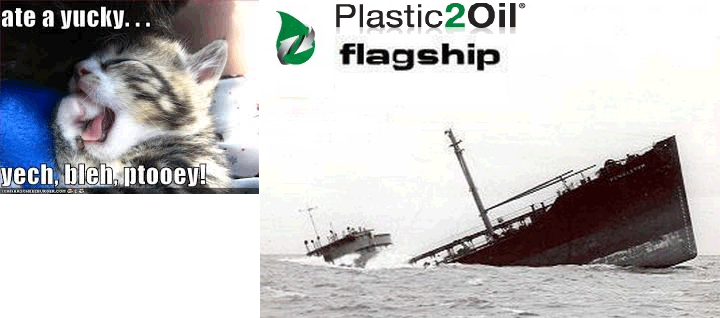"Additionally, with the increase in plastic to be processed both at our recycling facility and at our Niagara Falls facility in late 2012, we experienced some challenges in logistics, processing times and storage while managing the increase in volumes of plastic to be processed. "
The only thing that quote means is that they are having logistics issues with the small amount of plastic they processed, let alone enough plastic for true commercial production. Storage problems probably were also exacerbated by the inability to process plastic with processor 1 and 3 not producing and number 2 requiring down time to be made more efficient for processing No. 2 Fuel Oil.
Perhaps you missed the fact that they are required to buy plastic now to meet the quality and quantity they need?
Historically, we operated under the premise that we would be able to obtain significant quantities of waste plastic for free, as we offered companies a more cost-effective disposal method for this waste stream. During the year, as we processed increasing amounts of waste plastic, we made the determination that in order to obtain the most optimal feedstock on a consistent basis, we would be required to purchase this feedstock. We continue to receive free plastic from time to time, however, we have concluded that these sources are not able to provide us with the amount of feedstock required to consistently feed the processors at the optimum feedrates.
Not to mention all the paragraphs about possibly not being able to find what they need moving forward.
Our P2O business faces competition in acquiring feedstock, mainly because there are other technologies and processes that are being developed and/or commercialized to offer recycling solutions for plastic.
The effectiveness of our business model may be limited by the availability or potential cost of plastic feedstock sources.
Our P2O business model depends on the availability of waste plastic obtained at relatively low cost to be used as a feedstock to produce our end fuel products. If the availability of feedstock decreases, or if we are required to pay substantially more than is reasonable to become profitable for feedstock, this could reduce our fuel production and/or potentially reduce our profit margins if we are forced to use alternative, more costly measures to procure feedstock. It is possible that an adequate supply of feedstock may not be available to our P2O processors to meet daily processing capacity. This could have a materially adverse effect on our financial condition and operating results.
Our P2O financial results will also be dependent on the operating costs of our processors, including costs for feedstock and the prices at which we are able to sell our end products. Volatility in both the pricing of feedstock as well as the market price for fuels could have an impact on this relationship. General economic, market, and regulatory factors may influence the availability and potential cost of waste plastic. These factors include the availability and abundance of waste plastic, government policies and subsidies with respect to waste management and international trade and global supply and demand. The significance and relative impact of these factors on the availability of plastic is difficult to predict.
No, it's "insane" to think that feedstock is not an issue.
Why do we need an expensive CEO and COO? That's a good question. Maybe you should ask the whales. Or JB.


